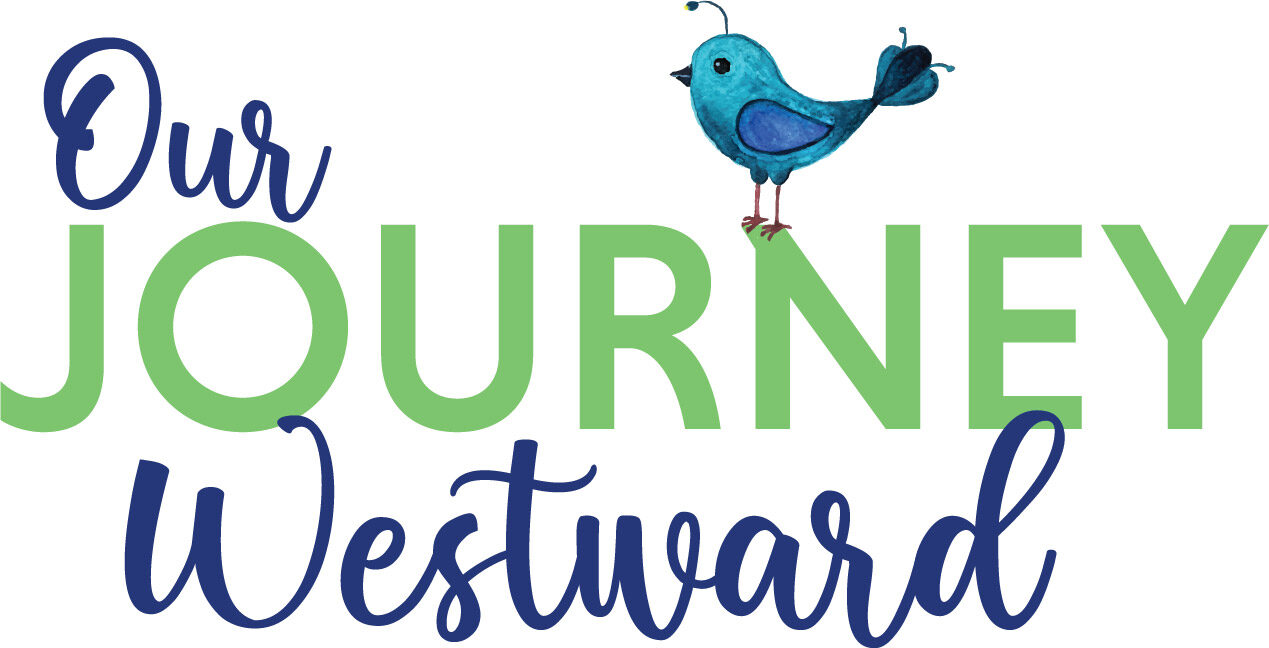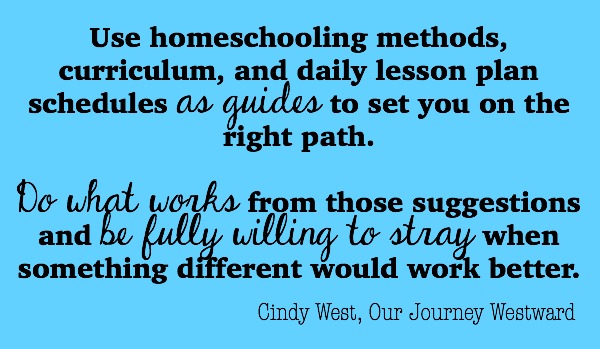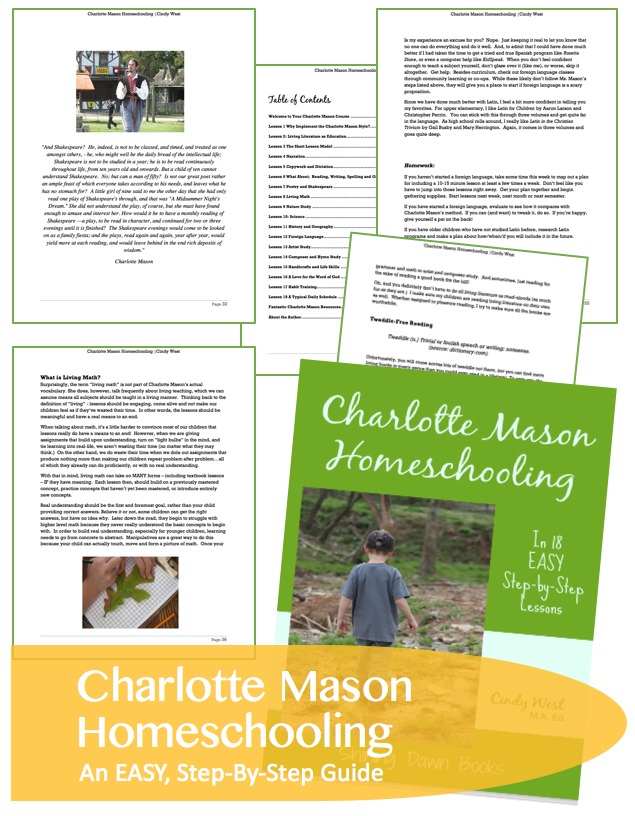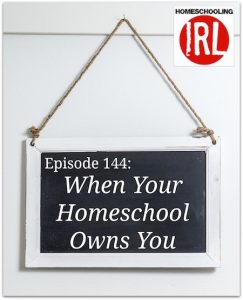Legalism in Homeschooling Methods
You don’t normally hear the word legalism in homeschooling circles unless the discussion is about religion. I’m not talking about religion today…or maybe I am.
Legalism in Homeschooling Methods
Do you remember me telling you about my much-needed summer of rest? Some of that rest involved time spent listening to homeschooling podcasts for encouragement and researching things here and there on the internet as I planned our (then) upcoming school year.
While I was certainly encouraged (!) and grabbed hold of a few new ideas to implement this year, I was frequently struck with a feeling of uneasiness. Over and over, the thought came to mind that we must be very, very careful that we don’t turn homeschooling – or especially any homeschooling method – into an idol.
We Know Homeschooling Isn’t a Ticket to Heaven
I feel like the homeschooling community is coming to grips with the long-held misconception that homeschooling our children is the ticket for all of us to get to heaven. If homeschooling were the answer, why would we need Jesus?
Praise God that we as a community are finally beginning to understand that we’re all sinners in need of a Savior. And, no homeschool – not one – produces perfect children. What a relief it is to know the pressure is off to be the perfect mom, teacher, wife and housekeeper in order to produce those perfect children!
Is a Method the Ticket to Perfect Homeschooling?
But, while we’ve knocked down the idea that homeschooling somehow saves us, my eyes have been opened to the fact that there are some mighty tight grips around homeschooling methods as a different kind of answer.
Not necessarily that a homeschool method is a surefire path straight to Jesus, but that a homeschooling method is THE way to teach. The idea that choosing the right method and doing it perfectly is now your surefire ticket to smart, well-adjusted children who will love to read the classics – in Latin, write eloquent dissertations, have the mathematical prowess of a CPA, and be able to manage a household with perfection, all while enjoying operas, painting masterpieces, quoting poetry, and knowing the scientific name of every living organism in a 200-mile radius. No superhero cape necessary.
You know that homeschooling methods were created by humans, right? No human is perfect. No one person has all the answers. None of those people who develop(ed) teaching methods have been in your home and walked in your family’s shoes for even one day.
While I don’t think general adherence to a certain homeschooling method is a bad thing, I want to urge some caution in believing you must follow any method to a T.
My Homeschool is Eclectically Charlotte Mason
Have you noticed that I’ve been calling myself an “eclectic Charlotte Mason” educator for years? That’s on purpose. It’s always been important to me that I distance myself just a tad from die-hard Charlotte Mason homeschooling.
Don’t get me wrong. I think many of Charlotte Mason’s methods are absolutely superb and I’ve implemented much of her philosophy into our homeschool for the last 15+ years and will continue to do so until my last child leaves the nest!
However, following someone’s basic philosophy and doing exactly as she does are two different things. I have seen great value in our homeschool over the years following Mason’s basic philosophy…short lessons that are mostly finished during the morning hours with afternoons free for pursuits like nature study, handicrafts and play. We have been incredibly blessed filling our days with such things as living literature and fine arts. Our lessons and lives have been rich indeed.
However, every single thing about the practical application of a Charlotte Mason style has been on terms that work for our family. The yearly, weekly and daily schedules fit our life. The curriculum varies from child to child based on their particular needs. The daily lessons are implemented in whichever way I see fit as the teacher of my children.
When the Method Turns Sour
If I had followed precisely everything Charlotte Mason prescribed, our homeschool life would not have been as vibrant over the years. I would have quickly lost my joy because God not only created me to teach, but He gives me great joy in using my creativity in teaching. My children would have lost their joy, too. The teaching books Mason suggested to be used with children at the turn of the 20th Century, would not have kept my highly active, utterly creative, and passionate children’s attention.
I get the idea that consistent use of those books develops a child’s attention span and interest over the years. I really do! But, I also know that we are 100+ years down the road from those suggestions. While there can be great value in tried and true things and I have indeed used and loved some of Charlotte Mason’s suggested materials, the hinges do not come off of a homeschool that veers off the course.
I have already successfully graduated one sweet child from our homeschool which follows Charlotte Mason principles, but veers off the course when it comes to the practicalities. She is doing SO well and I fully expect her brothers to follow suit.
We ARE Charlotte Mason Homeschoolers
I still very much consider ourselves a Charlotte Mason homeschool because we really do follow the basic method. For example:
- Our lessons are short and usually finished before lunch. (High school lessons do tend to stretch into the afternoons.)
- Each day includes wonderful selections of living literature.
- I try to make our lessons “living” as often as possible. To me, that means lessons that are worthy of our time with methods that incorporate as much real-life into them as possible.
- I spread a wide feast of ideas before my students through the “regular” lessons as well as things like nature study, picture study, composer study, Shakespeare, and poetry.
- My children are given time and encouraged to pursue interests in handicrafts, life skills, and music.
- We practice things like habit training and using time wisely.
Where do we veer off course? (If there really is a specified course.)
- We don’t read living literature for every single subject – and especially don’t read most of Charlotte Mason’s specific recommendations.
- While Charlotte Mason advocates reading small sections of several books over the course of a year for history, for instance, you’ll likely find me doing a unit study on one historical topic. We still read living literature, narrate some, keep a timeline and do map work just like suggested, but ours happens in segmented bursts of time when we use a unit study approach.
- You’ll also find me working through history and science in four (or so) year cycles – as found in many Classical models of homeschooling.
- My children narrate from their readings sometimes, but not for every lesson. Not even every day! I believe in the power of narration, but I find it to be overkill (and frustrating) when my children are expected to narrate everything.
- I’m a big believer in phonics instruction. While I do incorporate Mason’s methods of narration, copywork and dictation, I also work through a step-by-step phonics program with my children so they develop strong reading and spelling skills.
I’m quite sure I could go on with some differences. I’m assuming you’re getting the picture of what I mean when I say our homeschool certainly follows the overall Charlotte Mason philosophy while tweaking things to meet our needs.
You might be interested in listening to this podcast – even if just the first 15 minutes. In it, Pam Barnhill discusses with Brandy Vencel some of the same ideas I’m writing about here concerning making the Charlotte Mason method your own.
The Cost of Legalism
Unfortunately, I see more and more homeschoolers who want to follow the Charlotte Mason method hopelessly lost in trying to follow the practicalities instead. I know this because many of my homeschool consultations are full of people trying to wrap their real lives around what they think they have to do in order to be a bonafide Charlotte Mason homeschooler.
This same story is true of those who try to follow any homeschooling style or particular curriculum to a T. You will likely drive yourself crazy trying to stay completely on the course of someone else’s style, schedule or lesson plans.
I hear some version of the following during almost every single homeschool consult where someone has been trying to legalistically follow a homeschooling method – or even a particular curriculum.
- They feel like they can’t possibly do it “right.”
- They feel heavily burdened by homeschooling.
- They are ready to throw in the towel because it seems too hard.
- Their children are fighting against the school day.
Changing the definition of legalism above just a bit: “Excessive adherence to any homeschooling law or formula” tends to take people down the path of dissatisfaction.
You can imagine the freedom found in learning that a particular method or curriculum doesn’t have to be a ball-and-chain. Finding the courage to use what works and tweak what doesn’t (even if it strays from the method or curriculum) gives these mommas a renewed hope and spirit in homeschooling!
What’s the Answer Then?
Do what works for your family.
Use homeschooling methods, curriculum, and daily lesson plan schedules as guides to set you on the right path. Do what works from those suggestions and be fully willing to stray when something different would work better.
Practically Putting Charlotte Mason to Work for Your Homeschool
While I’ve been hinting that ANY method or curriculum needs not be followed to a T, I’ve put examples from this post in the perspective of Charlotte Mason homeschooling because that’s what I’m most familiar with. To that end, I will reiterate that the Charlotte Mason method – when not used legalistically – really is a great option.
If you’re interested in learning how to practically implement the methods with MUCH freedom to do so on your terms, I think you’ll love Charlotte Mason Homeschooling in 18 EASY Lessons! It offers you “just the basics” with simple ideas for implementation. By adding only one thing at a time to your routine, you won’t be overwhelmed at all in creating a Charlotte Mason style homeschool!
Take what you want, leave what you don’t. You have lots of homeschooling grace from me.
Listen!
I recently had the chance to discuss this topic with Andy and Kendra Fletcher on the HomeschoolingIRL podcast. If you have an extra half hour, I think you’ll love to hear our conversation.
This post has been linked to:







Your heart for homeschooling and homeschoolers never disapoint. I find so much encouragement in this place. I recently changed our science curriculum as a result of your post, “When Your Plan for High School Science Isn’t Working”. It was eye opening as well as the post about, “Chronological History in High School”. Thank you.
I’m so glad you find encouragement here, Pam! YOU just encouraged ME with your comment. 🙂
Hi! Thank you so much for this. I have always known that I do not HAVE to follow a curriculum exactly, but I have a hard time allowing myself to not get stressed out when we get off track. I’m not sure why this is. However, we are “Charlotte Mason” homeschoolers as well and I do the Ambleside Online curriculum for school. I find that my children are not loving school. They actually grown and whine about it. Then when I ask them what books they dislike SO much and what they really hate about school. They’ll say, “oh, nothing.” I’ll say well do you like this book and this other book and they’ll say yes I do. But then next time I call one of them over for school they are like whiny about it. It drives me crazy. How would you “fix” this or is there a fix.
Amanda, I’d have a family meeting and tell them exactly what you’ve just said…”Kids, I hear you whine about school work every day, yet you tell me you like the books we’re using. Let’s talk about why you’re frustrated when I start school work with you. If you tell me exactly what it is you don’t like, maybe we can find ways to fix it.”
You might find the answer to be in the curriculum, or possibly the way the day runs. Or, maybe even a little of both. I hope you all get it figured out soon! I’m happy to do a phone consult with you if you need further help. 🙂
Cindy this is such a great post. I agree with what you are saying the purist CM ideology can really suck the life out of homeschooling. Thanks for writing this.
Thanks for saying so, Michelle. Your opinion means a lot!
Wonderful post!! I too, gather ideas from different types of homeschooling methods. I am extremely eclectic, even changing ideas from year to year. I used to try to change some things during the school year but that proved to be too difficult for me and the kids. Now, I only change things if I see that they are really not working or if things are too frustrating. We also do history in a cycle, but I focus on a 5 year cycle instead of four. As a historian, I find that this is the best method for us to really delve deep into different topics. Have a wonderful weekend!
Michelle, with this third kiddo of mine, we are taking history at a slower pace, too! It just seems so like we have so much more time to meander through more than the high points. You have a wonderful weekend, too!
Our views sound similar. I call our family Charlotte Mason unschoolers. I do believe the basic principles of short lessons, narration, much outdoor time, including the arts, and so on. But we are quite unschoolish in our homeschool ways. I believe some basics need to be taught, but as a general rule my kids follow their own interests and our schedule is practically non-existent. We do what we want as we feel like it, pretty much.
I’ve graduated 3 kids on a 100% unschooling lifestyle and one on a CM unschooling lifestyle. They’ve gotten into college, so it worked for us! 🙂
It’s SO important to take into account family dynamics when developing a style, isn’t it? I always think how cool it is that completely different styles still produce completely competent young adults.